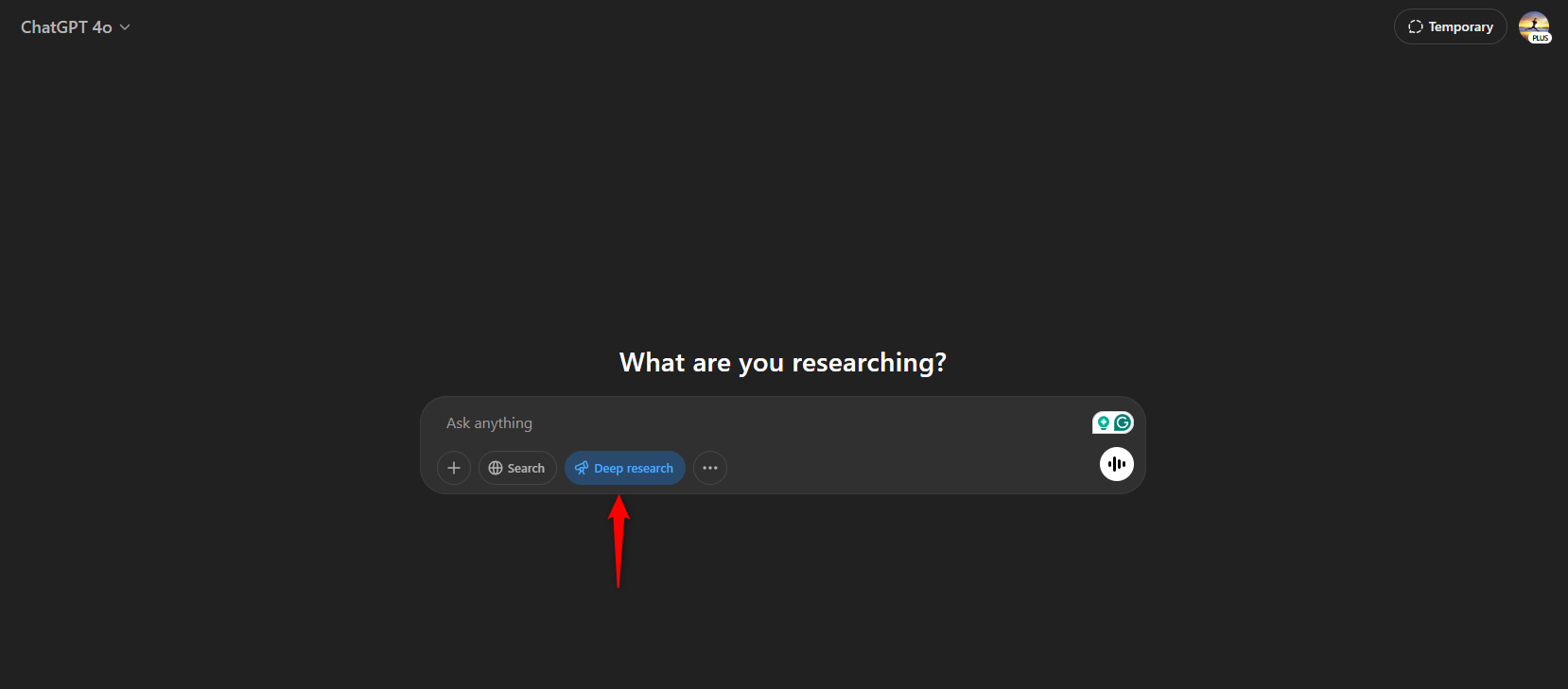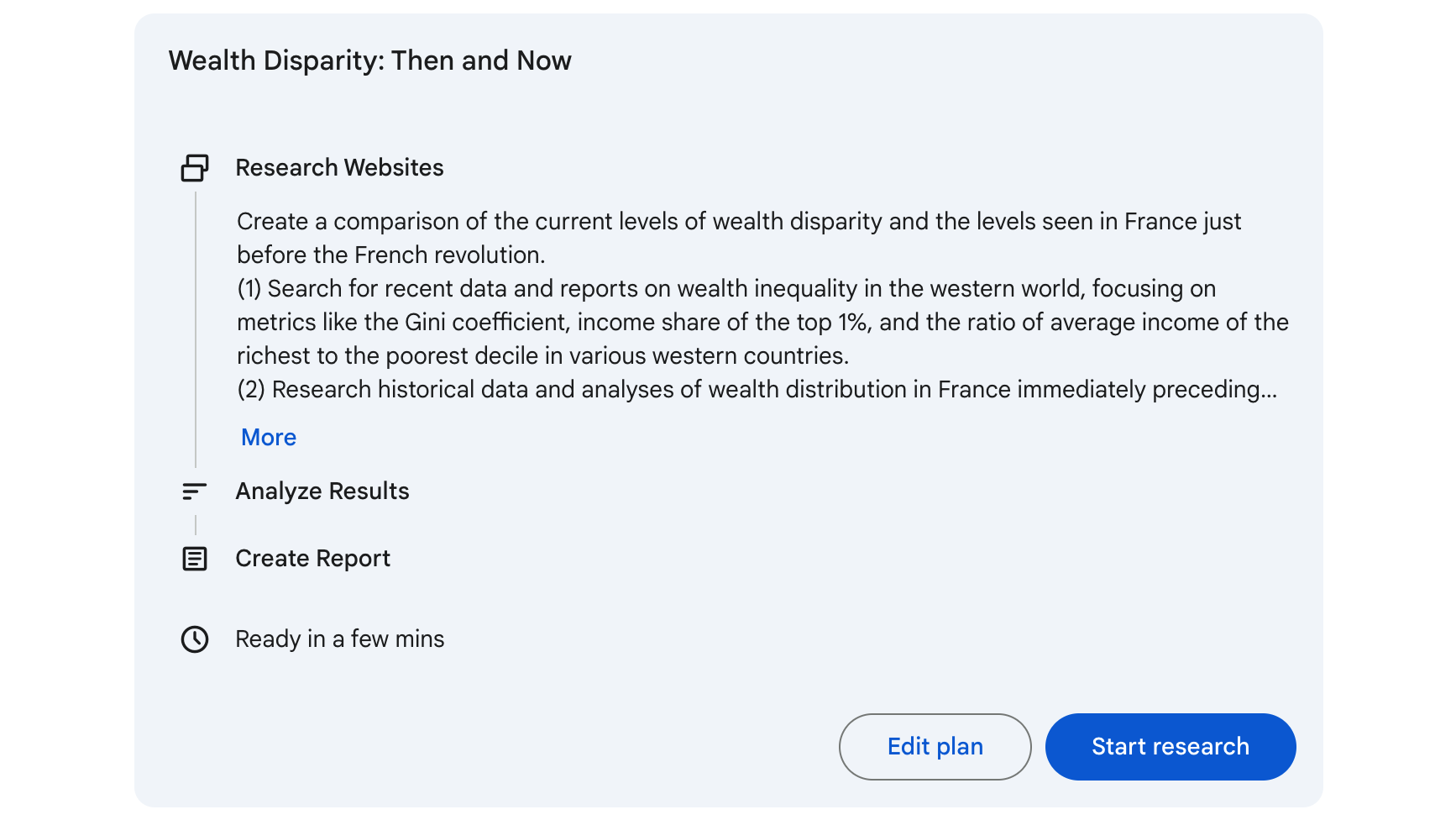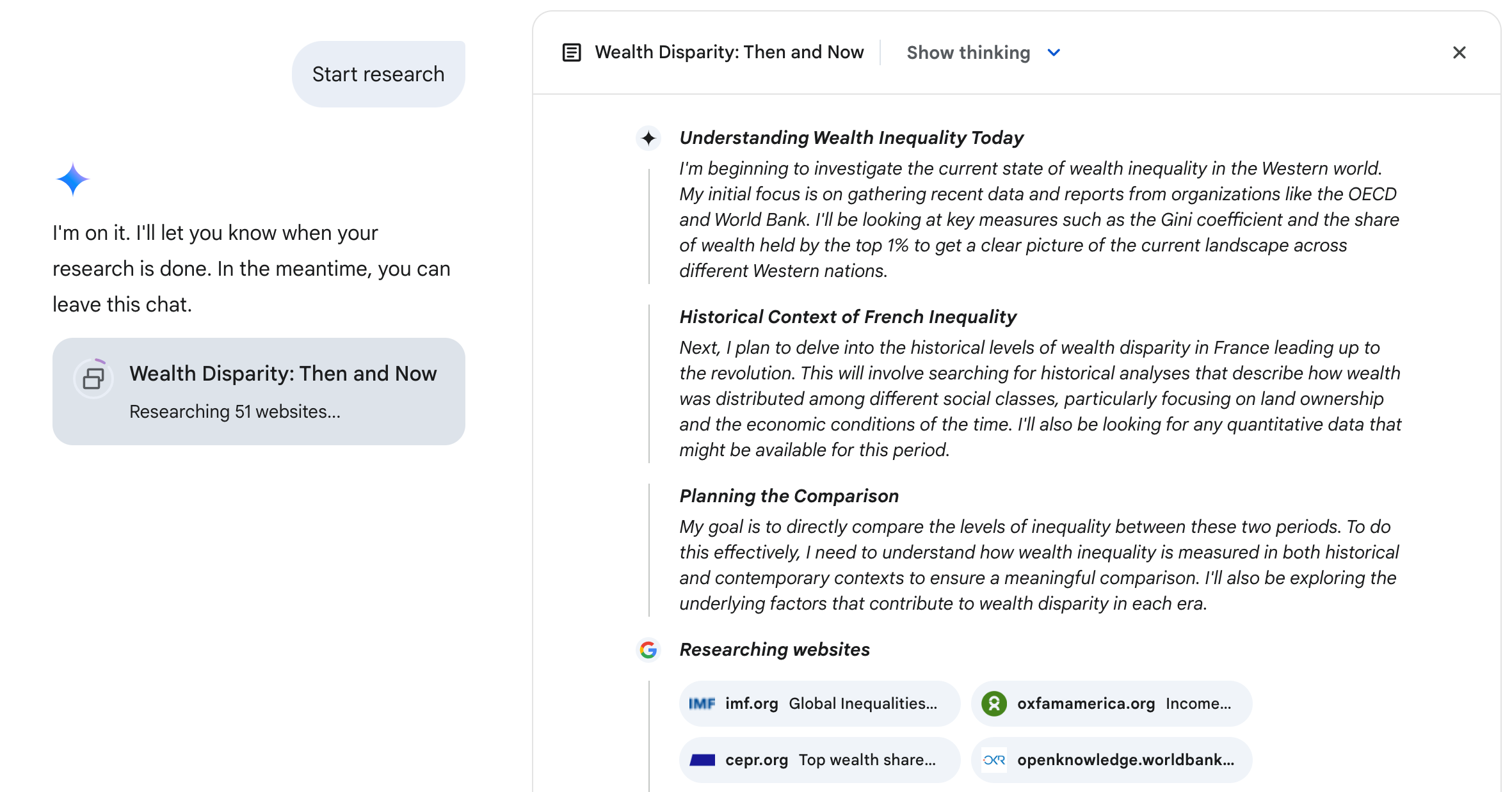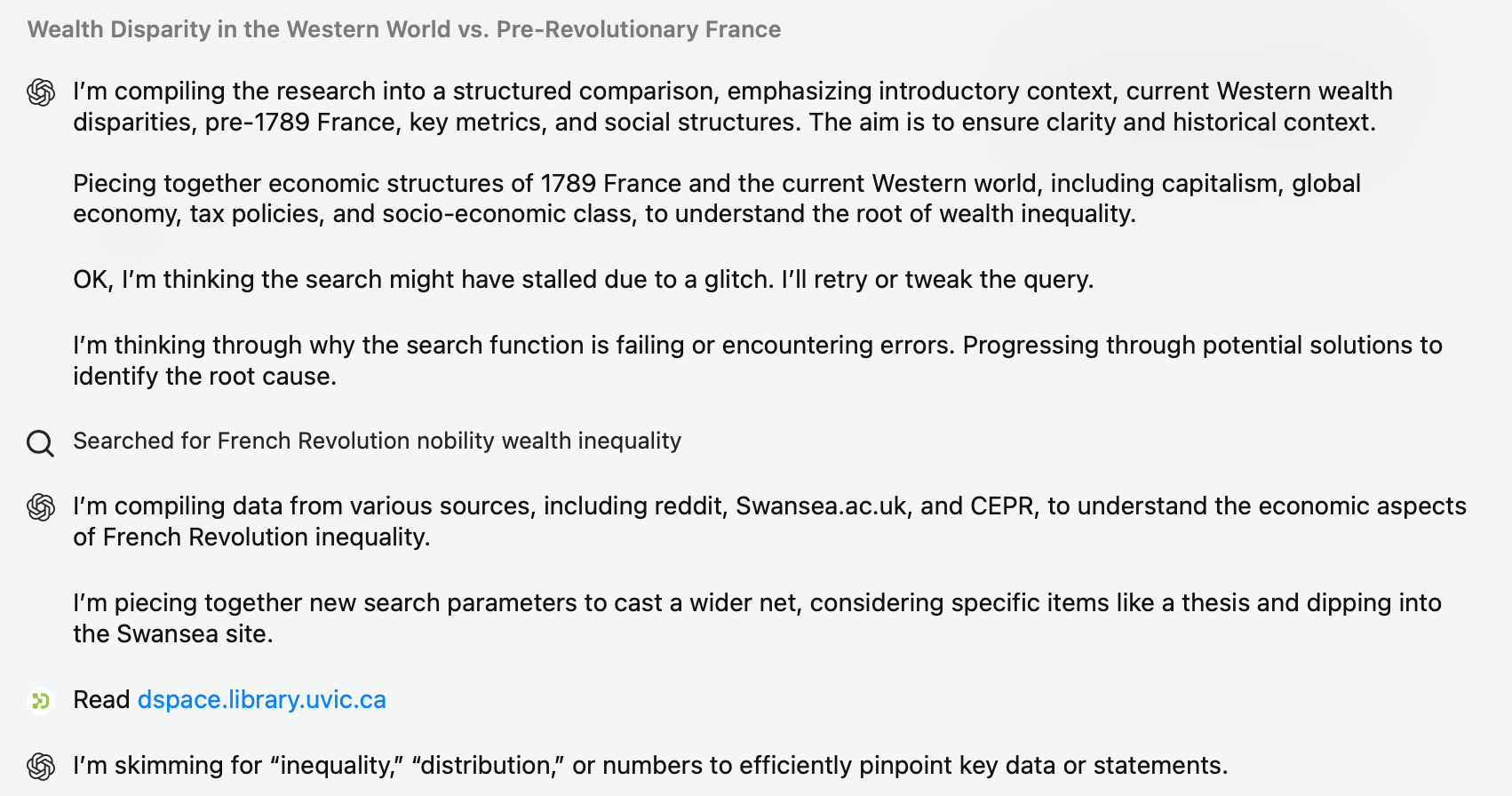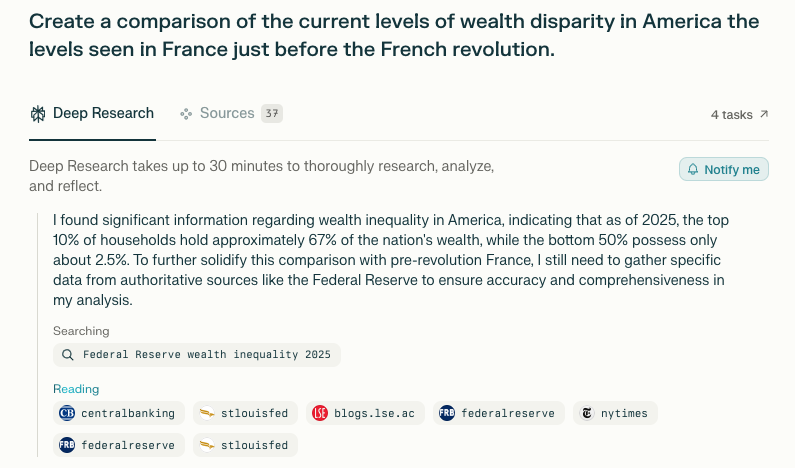Open a popular AI chatbot app right now, and the chances are that you’ll soon come across a feature called “Deep Research.” You can find Deep Research in ChatGPT, in Google Gemini, and in Perplexity. It’s rare that AI companies give a feature exactly the same name.
For example, ChatGPT and Gemini have Canvas, but Claude has Artifacts, which is essentially the same concept. While the features aren’t identical, Deep Research is similar across all three apps. Is this just a case of companies trying to keep up with one another, or is Deep Research a feature that you should take a look at?
Understanding Deep Research
It’s not entirely unsurprising that several companies have all used the same name for essentially the same feature because it gives a reasonably clear indication of what the feature does. In each case, rather than providing a short, almost instant response to a prompt, the AI chatbot will take its time to formulate a plan of action, perform research across a variety of sources, and finally output an in-depth report.
This is very useful when you need more thoroughly researched information than a standard AI chatbot model can provide. The speed of the response is sacrificed for a more methodical approach that can generate a much more comprehensive result.
Google Gemini’s Deep Research
Google was the first big company to introduce a feature called Deep Research in December 2024. It was initially released as an experimental model that was only available to Gemini Advanced subscribers, but in March this year, the feature was made available to everyone, including those without a paid subscription.
The intent of Google’s Deep Research was to take the onerous task of online research out of our hands and give it to the AI chatbot to handle. It works in a similar way to how a human would; once given a prompt explaining what to research, it comes up with a plan of action, searches for information from appropriate websites, revises its plan based on the information it’s discovered, and continues to repeat the process until it has gathered all the information that it thinks it needs.
The process can take some time, especially if a lot of research and analysis is required. You can see information about what the model is working on as it happens. Once Gemini has found all the information it needs, it is converted into an in-depth report with links to the sources.
Before Gemini gets to work on its plan, it will show you what it intends to do. You can approve the plan or make changes to it if you think it could do with tweaking. Once the final report is generated, you can export it to Google Docs or even generate an Audio Overview, which will turn the report into a podcast in which two AI-generated voices discuss the report in depth.
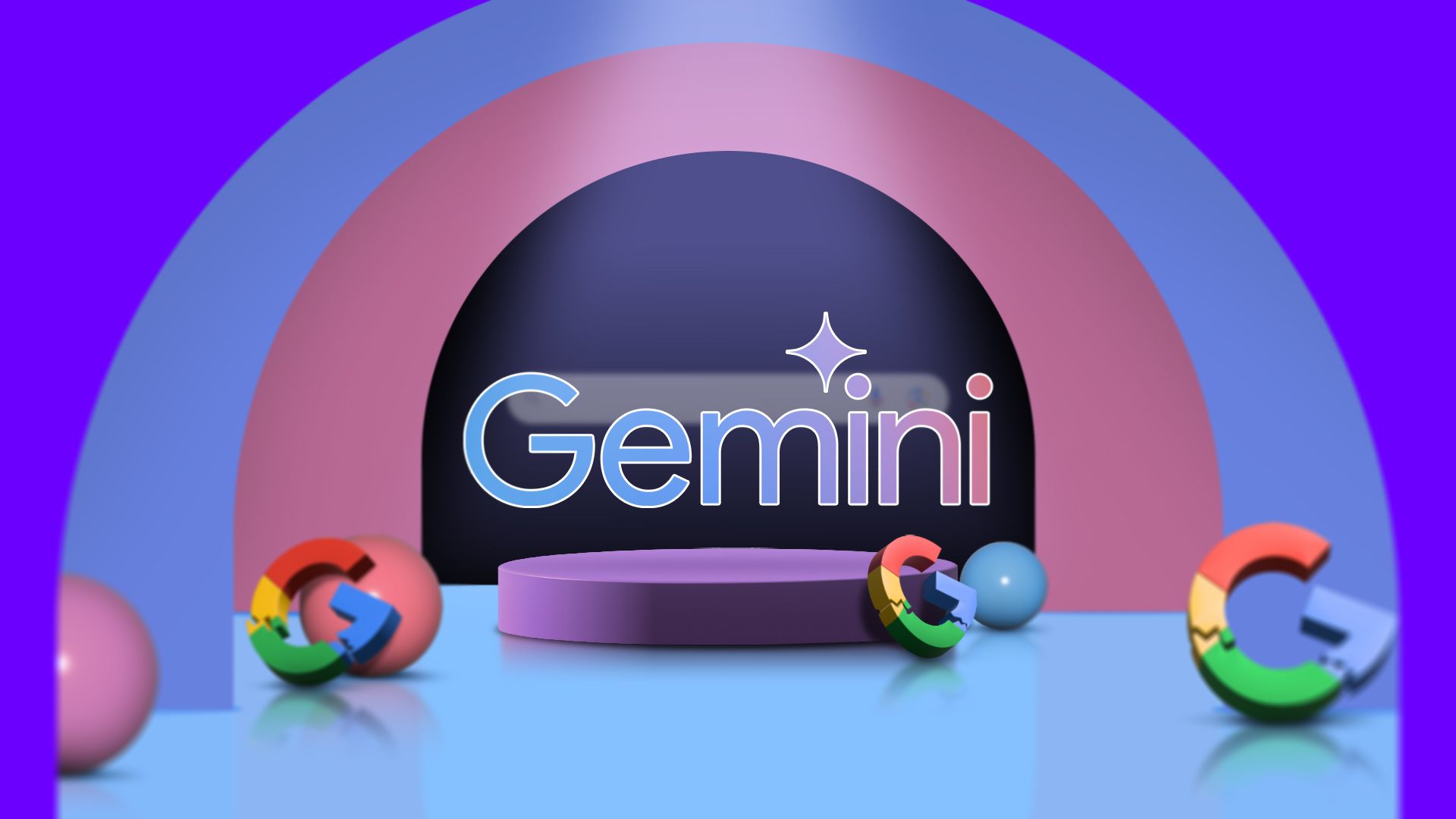
Related
Did Google Kill Its Own Search Engine With Gemini Deep Research?
Google’s not gonna give up its throne that easy!
OpenAI’s Deep Research
OpenAI released its own Deep Research feature in February 2025. It was initially only available to people with a $200 per month Pro subscription but was made available to Plus subscribers later that month. Unlike Gemini, it’s still not available for free.
The concept is very similar to Gemini’s Deep Research. When you enter a prompt with information about what you want to research, ChatGPT will usually ask a few questions to clarify exactly what it is that you want to achieve. If your prompt is broad, for example, it might ask if you want to focus on a specific area or generate a more general report.
Once you’ve confirmed what you want, ChatGPT will use a multistep approach to find relevant information online, analyze the information it finds, and then synthesize it into a report. It can take some time for the report to be generated, depending on how complex the research needs to be.
You can choose to see details of the steps that ChatGPT is performing during its research if you want, such as what the AI is planning to try or which sites it is looking at. The information is often remarkably similar to what you might try yourself, with searches for specific phrases that turn out to be fruitless, followed by further searches that use slightly different search terms.
Currently, ChatGPT is only able to generate written reports. Unlike Gemini, there’s no way to convert the report into an audio podcast. In my testing, ChatGPT also seems to take longer to generate its results than Gemini or Perplexity.
Perplexity’s Deep Research
Perplexity is a slightly different chatbot than Gemini and ChatGPT. Perplexity is intended first and foremost as a conversational search engine. Rather than being a general-purpose chatbot, Perplexity is intended to help you find information from the internet in a more accessible way and can also make use of models from competitors, such as OpenAI’s GPT-4o and Google’s Gemini 2.5 Pro.
Both ChatGPT and Gemini’s Deep Research features essentially rely on searching the web and generating a report from the information they find. Searching the web is the core purpose of Perplexity, so it’s no surprise that its Deep Research feature works in a similar way to the other two.
The chatbot creates a plan of what it needs to do to generate its report, then goes off and looks around the internet for the relevant information. It can change its approach based on the information that it unearths, and at the end of the process, it will create a research report based on what it has discovered.
As with Gemini and ChatGPT, you can see real-time updates of what is happening during the research. The final report includes a list of sources that the information was taken from so that you can go back and verify the details if you need to. There’s no option to convert your reports into audio with Perplexity, although it does email you a link to the report by default.
Should You Care About Deep Research?
AI companies clearly seem to care about Deep Research, as they’re all jumping on the bandwagon, but is it actually any use? It depends on what you’re trying to achieve. If you’re just seeking quick information on a topic, then Deep Research is overkill and will take far longer than using a standard model.
However, if you need some in-depth information, it can save you a lot of time. OpenAI’s website claims that Deep Research “accomplishes in tens of minutes what would take a human many hours,” and while they might be a little hyperbolic in some instances, it’s probably not far from the truth. If you ever spend time getting frustrated at how terrible Google search is these days as you try to find some key information, then Deep Research may be able to save your sanity.
I’m a big soccer fan, and I often see stats bandied around about how much clubs have spent and accusations of buying trophies. Trying to find the actual figures used to take me hours of searching and copying and pasting into spreadsheets. Now I can get AI to do all the research for me and get the exact information I want with very little effort.
What Might Come Next in Deep Research?
Currently, all the Deep Research features search the internet for the information that they need, predominantly in the form of text. However, the next step in Deep Research could see these models become multimodal and capable of handling other forms of information. They may eventually be able to use audio, video, or even real-time data, such as live financial markets, as sources of information.
One area where Deep Research could also see improvement is in the evaluation of its sources. There’s a lot of information on the internet, and not all of it is of the highest quality. Being able to verify information that it finds would help make Deep Research features even more powerful.
Deep Research may be one of the latest buzzwords in AI, but it can be a very useful tool in the right circumstances. It’s essentially taking the tedious act of trawling through websites looking for information out of our hands and letting the AI do all the heavy lifting. While it’s not perfect, it can generate some excellent results, and as with all AI features, it’s only going to get better from here on in.


